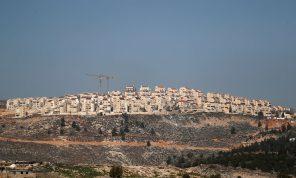The West Bank is on a powder keg that may explode next April. Keywords
The events of recent weeks, including tension in the Sheikh Jarrah neighborhood and the high number of Palestinian deaths in the West Bank, have strengthened the IDF's assessment, which is that sometime in April, between Ramadan and Passover, a real escalation may flare up in the territories " [West Bank]. And if the prophecy comes true, it will be the second outbreak in less than a year, after the “guard of the walls” in the Gaza Strip last May. The fact that the two sides ended the previous round with a sense of a tie and without a fundamental change in the picture of the situation contributes to the development of another round.
The commander of the Judea and Samaria Division, Brigadier General Avi Plaut, ends the documents he sends to the commanders in the division with the slogan “Tomorrow is war.” This is an old habit of the Israeli army, which military mythology attributes to the banners that were hung in the operating rooms of the Northern Command after the Yom Kippur War, as a result of the shocking surprise in that war. The payoff is obvious: a leader who keeps his soldiers on alert. There is a danger of a prophecy materializing itself, at a time when the shadow of the mountains will be interpreted as mountains and lead to preventive steps or a strong Israeli response.
The signal to start the operation last May was given when the Hamas leadership intervened in what was happening in Jerusalem. After the events of Sheikh Jarrah, Bab Al-Amoud, and Al-Haram, the Hamas leadership in Gaza chose to express its solidarity by firing six rockets into the capital area. Israel responded with heavy bombardment of the Strip, and a round of fighting began. This time, despite the traditional threats, Hamas appears to be a little more disciplined. It may be that the current situation in the Strip, in terms of certain economic facilities, relative calm on the borders, and plenty of time for preoccupation with reconstruction and improvement of military power, conceals with it more advantages than it does.
The detonator, if it comes, may result from the combination of religious fervor in Jerusalem (primarily on the Temple Mount) and the start of Ramadan. Therefore, the Israeli army prepared through six maneuvers that will take place in the regional brigades of the Judea and Samaria Division, over the coming weeks, in addition to updating its practical programs in the West Bank.
Meanwhile, the region itself is buzzing with activity related to the challenge that Hamas poses to the PA's rule in the West Bank, and the corruption and weakness that represents the performance of the PA itself. Last week, the Special Police Unit killed three Fatah militants, after ambushing them in the heart of Nablus. This week, two unarmed Palestinians were killed by army fire in incidents in the Jenin and Ramallah areas. A large part of the Israeli arrestees in the Nablus and Jenin areas have recently been confronted with gunfire at the Israeli army forces. The number of incidents of stone throwing and Molotov cocktails thrown at Israeli cars in the streets of the West Bank has doubled in recent months.
There has also been an increase in settler violence against Palestinians (this week 18 Israelis were arrested on suspicion of rioting in the village of Hawara, south of Nablus). And high-ranking figures in the authority threatened Israel, whether by revoking the Palestinian recognition of Israel or “in a hint” by joining the violence against it.
Some of the Israeli army commanders on the ground see in the accumulation of these conditions a barrel of explosive material waiting to detonate. Dr. Michael Melstein sees things a little differently. He wrote that the PA threatens Israel with an "empty storehouse." According to him, with the exception of cases of religious flare-ups in Jerusalem, the West Bank public responds to the violent events with Israel with indifference, and even the rise in the death toll in these events does not prompt it to endanger relative stability.
Milstein believes that the real danger awaiting us is not the outbreak of a third intifada or the disintegration of the PA and “returning the keys” to Israel, but rather the slow creep of Israelis and Palestinians towards realizing the idea of a one-state. All of this will happen, Milstein warned, “without deliberate intent or planning on the part of Israel, which finds itself in a future reality that threatens its ability to exist as a Jewish and democratic state.”
In addition to the sensitivity in the “territories” [the West Bank] and Jerusalem, internal political distress over the relations of the “United” list with other coalition lists. Dissatisfaction is growing among the list of the Islamic Movement against the background of the failure to keep promises on the part of the government. Within the southern wing of the Islamic Movement, which supports the party's chairman, Knesset member Mansour Abbas, criticism of his steps is intensifying. Milstein said that the coalition depends on restraint, against the background of the inability to pump large and sufficient budgets into the Arab sector, the difficulty of rapid progress towards projects and the continuation of rampant crime in Arab villages. Under these circumstances, if we use violence in the territories, this may also merge with tension in the mixed cities inside the Green Line.
Press the accelerator pedal without shifting
Almost two years ago, after 25 years in the intelligence department, Colonel Moshe Tal was discharged from his third service in the Israeli army. Tal has found another, more interesting career path as a sports analyst in the United States.

Hamas is holding the bodies of two Israeli soldiers killed in Operation Protective Edge. Intelligence estimates that Hamas is holding two alive, the two Israelis who crossed the border into the Strip in the year following the operation. Despite Hamas' attempt to blur the image, the real situation is clear to Israel. They are alive, but the soldiers are not.
As an intelligence officer, Colonel Tal spent years trying to find the kidnapped soldier, Gilad Shalit. After that, he told him that the security apparatus, like the Israeli public, was still shocked by the Shalit deal. In the absence of an operational capacity to save him, the Netanyahu government conceded and paid a heavy price: the release of 1,027 Palestinian terrorists, including hundreds convicted of participating in killings, in exchange for one soldier. There is a sense that it has been overpriced and has slowed down the processing of the current case. It is clear that the price that Israel will agree to pay for the soldiers' bodies and the living ones will be less than the price paid for the living soldier.
Israel is not seeking a deal. Nothing productive happens. And there is a sign that we will not reach a real dynamic of negotiations with Hamas. As for the discussion that takes place every few months on the issue of negotiations between us and the Egyptian intelligence, it is just maintenance, not progress.”
Tal also said that “to the best of my knowledge, for the first time, an interesting behind-the-scenes process took place in the fall of 2018, shortly after the former Chief of Staff, Gadi Eisenkot, terminated his post. Eisenkot, who did not forget his responsibility for his soldiers whose bodies remained in Gaza, initiated an internal agreement between him and his counterparts at the time at the heads of the Mossad and Shin Bet, Yossi Cohen and Nadav Argaman. And these three determined for themselves, for professional purposes, what in their opinion was the reasonable rate for what Israel would pay in the framework of a deal for the future release of the four Israelis, and they informed Netanyahu of this. The goal, according to Tal, is to show Netanyahu that he has “the back” of the professionals to advance the negotiations because there is room for maneuver that might enable a deal to be struck. In fact, the initiative died without any real change taking place.
“Last summer, there was a certain possibility of a hack. In the last months of Netanyahu’s term, it became clear that there had been some deviation in his excellent relations with Egyptian President Abdel Fattah El-Sisi.” According to him, during these months Al-Sisi rejected proposals to hold meetings and hold talks in which the issue of missing persons could also be discussed. Things changed for the better after the appointment of the new Prime Minister, Naftali Bennett, last June. At first, a successful phone call took place between Bennett and Sisi. Then, after about a week, an Israeli delegation met with high-ranking Egyptian intelligence figures in Cairo.
In this meeting, a senior Egyptian source told his Israeli interlocutors that he was appointed on a personal mission by President Sisi to reach a solution, not a deal. According to Tal's explanation, from Cairo's point of view, the emphasis shifts to a solution to the humanitarian problem, which is the fate of the prisoners, instead of a condition for achieving tangible progress in reaching a broad and long-term settlement of the problems in the Gaza Strip. In informal talks, the Egyptians begged the Israelis to soften their positions and release more Palestinian security prisoners. According to the Egyptian analysis, the first preference in the negotiations for the Hamas leader in the Strip, Yahya Sinwar (who himself was freed from prison in the Shalit deal), is more prisoners, not more economic facilities.
The Egyptian side in the deal
Egypt gains from the exchange deal, as it is convinced that Israel can use its influence on the US administration to mitigate its requests towards it in the field of preserving human rights. In doing so, allowing the infusion of economic and security aid. Cairo aspires to technological assistance from Israel, and to advance large projects in the field of water desalination that Egypt needs.
Another ambition has been added to this, which reflects the spirit of the times in the Middle East: against the background of the “Abraham Accords,” Egypt hopes to enlist Israeli help to persuade the Gulf states to invest more of their money in joint technological projects that can advance Egypt's economy and alleviate some of its suffering. The population (although past experience shows that a large part of the money somehow reaches the pockets of the generals and their associates). Egypt's message to Israel remained the same: Be more flexible in the price and you will add advantages to us, then we will know how to bring Hamas to the table.
The new Egyptian offer caused hesitation on the Israeli side, and Tal believes there is something in it. In 2011, when Egypt wanted to close the Shalit deal, it used pressure on Hamas, including detaining Hamas Chief of Staff Ahmed al-Ja’bari in a hotel in Cairo for six weeks, until he agreed (Israel assassinated al-Ja’bari nearly a year later in Operation “Pillar of Defense”). However, despite certain sensitivities that took place, Bennett has not yet pushed forward with concluding the next deal, like his predecessor, Netanyahu.
The Israeli assumptions collapsed, said Tal. Despite the easing policy in Gaza, Hamas risked a military confrontation in Operation “Guardian of the Walls.” While the continuation of the facilitation since then, including the entry of ten thousand workers from the Strip into Israel, did not convince Hamas to agree to a comprehensive settlement, which would also solve the issue of Israeli prisoners and missing persons. Sinwar is still sticking to his demands.
Tal also attributes this to the absence of public pressure on the government to resolve the issue. Therefore, he decided to conduct an interview, and actively raised funds with the aim of starting a media campaign trying to raise interest in the plight of detainees in Gaza and their families. The campaign will be launched on billboards in the country's streets early next month. This is an amazing and unique initiative for a retired officer. It is still hard to see how the government will push harder to solve this problem.
Written by: Amos Harel
Haaretz 2/18/2022










